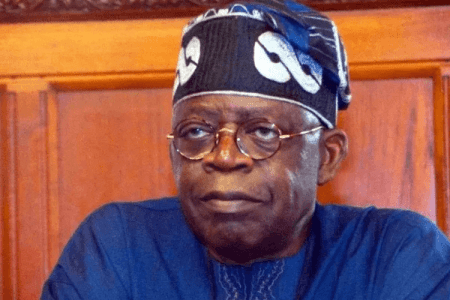By Ade Martins-
Nigeria’s new President, Bola Tinubu, has replaced the chiefs of all of Nigeria’s security services in a major shakeup that takes effect immediately, the presidency said Monday.
According to a statement from the Secretary to the Government of the Federation’s office said replacements were named to lead the military and police as the West African nation’s struggles with conflicts in several regions as well as violence crime.
The shakeup changed the heads of the army, air force, navy, police and defence intelligence.
Nigeria is confronted by a variety of security problems, including an Islamic extremist insurgency linked to the Islamic State group in the northeast, rebels in the northwest and secessionists in the southeast. Thousands have been killed in the last year amid worsening fighting.
Tinubu took office as president on May 29, against the backdrop of severe protests and division in the country, as court cases by aggrieved political rivals against his presidency continue.
On his first day in office, he said: “We shall invest more in our security personnel, and this means more than an increase in number. We shall provide, better training, equipment, pay, and firepower.”
The issue of insecurity has been a pressing concern in Nigeria, prompting discussions on potential solutions. With the upcoming presidential election, there are speculations about the possible impact of Bola Tinubu, a prominent political figure, becoming the president and subsequently changing the security leadership, including the Navy, Army, and Police. This article explores the potential effects of such a move in tackling the multifaceted challenges of insecurity in Nigeria.
The Security Crisis in Nigeria
Nigeria has been grappling with a range of security issues, including insurgency, terrorism, armed banditry, kidnapping, and communal clashes. These challenges have had severe social, economic, and political consequences, hampering development and eroding public trust. Addressing these issues requires a comprehensive and strategic approach, including effective leadership and coordination among security agencies.
As a former governor of Lagos State, he demonstrated leadership abilities and garnered substantial support from different sections of the population, his eventual appointment as president, generating expectations that he will bring about transformative change, particularly in addressing the nation’s security challenges.
His supporters say the major transition is aimed at injecting fresh perspectives, enhancing professionalism, and fostering better coordination among security agencies by selecting competent and experienced individuals to his taste to lead these crucial institutions, improving intelligence gathering, strategic planning, and operational efficiency in combating insecurity.
A significant challenge in Nigeria’s security landscape is the lack of seamless cooperation and coordination among various security agencies. By reshuffling security leadership, Tinubu could prioritize fostering interagency collaboration. This can include joint trainings, intelligence sharing, and the implementation of unified strategies. Enhanced collaboration would help bridge gaps, improve response times, and strengthen the overall effectiveness of security operations.
Nigerian leaders are notorious for high levels of corruption, but optimists who have faith in Tinubu expect him to carefully select leaders based on competence, integrity, and the ability to navigate complex security dynamics.
Changing security leaders alone is not a panacea for Nigeria’s security challenges. Tinubu is also expected to focus on implementing long-term strategies that address the root causes of insecurity, such as youth unemployment, poverty, and weak governance. These efforts should involve investments in education, job creation, social infrastructure, and institutional reforms to build a resilient and inclusive society.
Meanwhile, Tinubu also dissolved the governing boards of all government agencies with new boards expected to be formed and approved by the legislature in the coming weeks.

